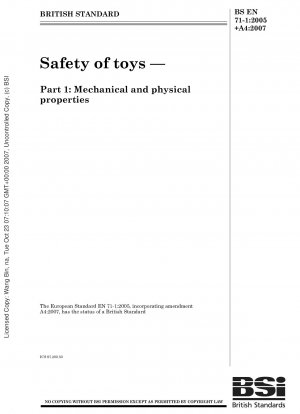BS EN 71-1:2005
Safety of toys — Part 1: Mechanical and physical properties
- Standard No.
- BS EN 71-1:2005
- Release Date
- 2005
- Published By
- British Standards Institution (BSI)
- Status
- 2005-12
- Replace By
- BS EN 71-1:2005+A4:2007
- BS EN 71-1+A9:2005
- Latest
- BS EN 71-1:2011+A3:2014
- BS EN 71-1:2014
- BS EN 71-1:2014+A1:2018
- BS EN 71-1:2011+A2:2013
- BS EN 71-1:2005+A6:2008
- BS EN 71-1+A9:2005
- Scope
- This European Standard specifies requirements and methods of tests for mechanical and physical properties of toys. This European Standard applies to toys for children, toys being any product or material designed or clearly intended for use in play by children of less than 14 years. It refers to new toys taking into account the period of foreseeable and normal use, and that the toys are used as intended or in a foreseeable way, bearing in mind the normal behaviour of children. It includes specific requirements for toys intended for children under 36 months and for children who are too young to sit up unaided. For the purpose of this European Standard, soft-filled toys with simple features intended for holding and cuddling are considered as toys intended for children under 36 months. This European Standard also specifies requirements for packaging, marking and labelling. This European Standard does not cover musical instruments, sports equipment or similar items but does include their toy counterparts. This European Standard does not cover electrical safety aspects of toys. These are covered by EN 50088, Safety of electric toys. Furthermore, it does not cover the following items which, for the purpose of this European Standard, are not considered as toys: ? Christmas decorations (see A.2); ? detailed scale models for adult collectors (see A.2); ? equipment intended to be used collectively in playgrounds; ? sports equipment; ? aquatic equipment intended to be used in deep water; ? folk dolls and decorative dolls and other similar articles for adult collectors; ? "professional" toys installed in public places (shopping centres, stations etc.) (see A.2); ? puzzles with more than 500 pieces or without picture, intended for specialists; ? air guns and air pistols (see A.2); ? fireworks, including percussion caps except percussion caps specifically designed for toys; ? slings and catapults (see A.2); ? sets of darts with metallic points; ? electric ovens, irons or other functional products operated at a nominal voltage exceeding 24 V; ? products containing heating elements intended for use under the supervision of an adult in a teaching context; ? vehicles with combustion engines (see A.2); ? toy steam engines; ? bicycles designed for sport or for travel on the public highway; ? video toys that can be connected to a video screen, operated at a nominal voltage exceeding 24V; ? babies' dummies (soothers); ? faithful reproductions of real fire arms; ? fashion jewellery for children (see A.2). Also, for the purpose of this European Standard, the following items are not considered as toys: ? flotation aids such as arm bands and swim seats (see A.23); ? swimming goggles, sunglasses and other eye protectors as well as bicycle and skateboard helmets (see A.19); ? items that are propelled into free flight by a child releasing an elastic band (e.g. aeroplanes and rockets). These are considered as catapults (see 11th indent above); ? bows for archery with an overall relaxed length exceeding 120 cm.
BS EN 71-1:2005 history
- 2011 BS EN 71-1:2011+A3:2014 Safety of toys. Mechanical and physical properties
- 2014 BS EN 71-1:2014 Safety of toys. Mechanical and physical properties
- 2011 BS EN 71-1:2011+A2:2013 Safety of toys. Mechanical and physical properties
- 2011 BS EN 71-1:2011 Safety of toys. Mechanical and physical properties
- 2005 BS EN 71-1:2005+A6:2008 Safety of toys — Part 1: Mechanical and physical properties
- 2005 BS EN 71-1:2005+A4:2007 Safety of toys - Mechanical and physical properties
- 2005 BS EN 71-1:2005 Safety of toys — Part 1: Mechanical and physical properties
- 2001 BS EN 71-1:2001 Safety of toys - Mechanical and physical properties
